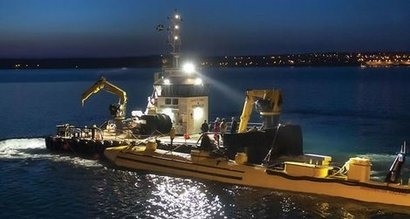
The Floating Tidal Energy Commercialisation (FloTEC) project will demonstrate the potential for floating tidal systems to provide low-cost, high-value energy to the European grid. The award was announced by Scottish Energy Minister, Fergus Ewing, on 23rd February 2016 in his keynote address at the International Conference on Ocean Energy (ICOE) in Edinburgh.
“I am delighted that Scotrenewables has been successful in securing 10 million euros from the European Commission’s Horizon 2020 programme” said Mr Ewing. “Scotrenewables has proven that collaboration is a vital component in overcoming the challenges facing successful tidal energy deployment - a view echoed by the members who have joined this impressive partnership. The Scottish Government and our enterprise agencies have been proud supporters of Scotrenewables from the early days of the development of the SR250 prototype. Scotrenewables has taken a significant step closer to demonstrating that extracting energy from our seas can be a commercially viable, cost competitive option for producing clean, green energy.”
James Murray, Business Development Manager at Scotrenewables Tidal Power added that the ambition of FloTEC is to drive down the cost of tidal energy through the delivery of a number of targeted innovations on an enhanced variant of Scotrenewables SR2000 floating tidal turbine. Engineering will commence in early 2016 and will include advanced power conversion hardware, low-cost manufacturing technologies, load reduction mooring components and integrated energy storage.
Led by Scotrenewables, FloTEC brings together a unique partnership of the most experienced and committed commercial, industrial and research organisations involved in tidal energy today: DP Energy; Harland and Wolff Heavy Industries; the European Marine Energy Centre (EMEC); ABB Ltd; EireComposites; Technology from Ideas; University College Cork; and SKF.
The FloTEC project will advance Scotrenewables’ current 2 MW floating tidal technology, the SR2000, with the development of a mark 2 turbine. This will be installed alongside the SR2000-M1 at the Fall of Warness tidal test site in Orkney, operated by the European Marine Energy Centre (EMEC). It will form a 4 MW floating tidal array to serve as a demonstration platform for commercially viable tidal stream energy as well as optimising energy extraction for arrays in locally varying tidal resources.
There will be a significant focus on reducing the levelised cost of energy (LCOE) at every stage of the design, build and demonstration of the SR2000-M2, with significant capital and operational cost reductions expected.
Horizon2020 is the European Commission’s largest research and innovation programme with nearly 80 billion euros of funding available over 7 years (2014 to 2020), in addition to the private investment this money will attract. The aim of the programme is to help drive economic growth and create jobs by coupling research and innovation with an emphasis on excellent science, industrial leadership and tackling societal challenges.
For additional information:

